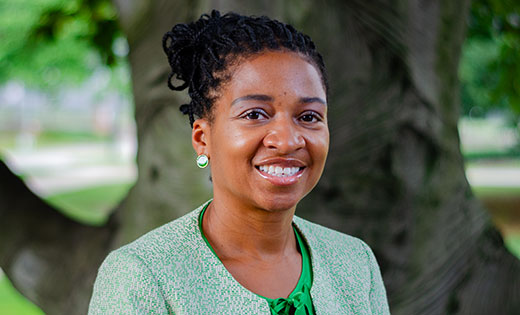Jennifer T. Kaalund
 Associate Professor of New Testament
Associate Professor of New Testament
Year Started at PTS: 2021
CONTACT INFO
412-924-1386
EDUCATION
- Ph.D., Drew University / New Testament and Early Christianity
- S.T.M., Union Theological Seminary
- M.A., Seton Hall University / Theology and Biblical Studies
- M.H.A., Virginia Commonwealth University / Healthcare Administration
- B.A., University of North Carolina / Chemistry
Academic Bio
Dr. Jennifer T. Kaalund is passionate about equipping the next generation of Christian leaders to face the world’s biggest crises: poverty, climate change, and systemic racism. She sees theological education as a vital resource in this endeavor, and she draws from a wide range of scholarship—and an emphasis on context—to bring energy and life to the classroom.
“My teaching philosophy reflects my interests in collaborative and contextual learning,” says Jennifer. “I believe that students should understand that the New Testament is inextricably linked with issues of politics, history, economics, and culture. Welcoming the various contexts of the students into the classroom allows them to learn from each other. Hence, my goal is to leverage the diverse and specific cultural experiences of my students to enrich the pedagogical encounter.”
Because of this educational philosophy, Jennifer’s teaching is dynamically linked to her scholarship. Her research considers contextual biblical hermeneutics, contemporary use of the New Testament, and material culture. Specifically, she brings focus to various ways Christians past and present make meaning while examining how race, ethnicity, gender, and class facilitate complex identity negotiations. Her studies also account for issues of power and violence, particularly the context of empires.
She invites students into these topics, encouraging them to explore what this meaning-making and identity-negotiation mean for their own lives and ministries. “It is my aim to prompt my students to consider how their own contexts influence their readings of texts and their understanding of religion more generally,” Jennifer explains. “My research informs my approach to teaching.”
Selected Publications
Reading Hebrews and 1 Peter with the Great Migration: Diaspora, Identity, and Place (London and New York: Bloomsbury/T&T Clark, November 2018).
“In Christ, but Not of Christ: Reading Identity Differences Differently” in Minoritized Women Reading Race and Ethnicity, Mitzi J. Smith and Jin Young Choi, eds. (Fortress/Lexington Press, September 2020), 23-44.
“Flowing from Breast to Breast: An Examination of Dis/placed Motherhood in Black and Indian Wet Nurses,” (with Sharon Jacob) in Womanist Biblical Interpretation: Expanding the Discourse, Gay Byron and Vanessa Lovelace, eds. (Atlanta: Semeia, November 2016), 209-238.
PROFESSIONAL COMPETENCIES
Areas of Specialty
- Early Christianity
- Contextual Biblical Hermeneutics
- Contemporary Uses of the New Testament
- Religious Identity Formation
- The Letter to the Hebrews
PROFESSIONAL SERVICE
Professional Societies
- Society of Biblical Literature
- Bible Odyssey—editorial board member
- Space, Place, and Lived Experience in Antiquity—steering committee co-chair
- American Academy of Religion
- North American Patristic Society
- Catholic Biblical Association
Academic Journals
- Journal of Feminist Studies in Religion—editorial board member
AWARDS/FELLOWSHIPS/DISTINCTIONS
- 2020: Junior Faculty Award, Iona College
- 2019-2020: Fellowship for Early Career Religion Faculty at Colleges and Universities, “More Than a Feeling: A Pedagogy of Care, Integrating Radical Compassion into the Classroom”
- 2018-2019: Wabash Center for Teaching and Learning in Theology and Religion, Workshop for Early Career for Religion Faculty
- 2012: The Fund for Theological Education, Dissertation Fellowship
- 2006: John Paul II Award for Academic Excellence, Seton Hall University
ADDITIONAL RESOURCES
- High res image
- Doing it Different is a limited podcast partnership with Porshanality Media and Pittsburgh Theological Seminary. This podcast explores the Seminary's cutting-edge Doctor of Ministry degree and its various focus areas. In this episode, the Rev. Porsha Williams Gates interviews Dr. Jennifer Kaalund who has recently joined Pittsburgh Theological Seminary as associate professor of New Testament. Dr. Kaalund talks about hope, womanism, favorite Scripture passages, and her commitment to interpreting Christian Scripture as a word from God that brings people together rather than as a weapon that wounds. Listen in.
